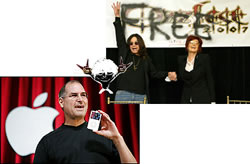 I don’t know about you, but there’s something about the word "free" that sounds like there has to be a catch somewhere. But recently, it was a common element in a couple of music stories that has to get you thinking.
I don’t know about you, but there’s something about the word "free" that sounds like there has to be a catch somewhere. But recently, it was a common element in a couple of music stories that has to get you thinking.
First, Steve Jobs comes out with a paper that urges record labels to dump DRM (or Digital Rights Management) completely, allowing users to copy and share music files. As he points out, only 10% of music is sold through digital music stores to begin with. Album sales continue to drop, so Jobs’ concept – while risky – might stimulate a more viral competitive environment.
Next, Sharon Osbourne and Live Nation announce that Ozzfest will now be free. Tickets will now be distributed for "Ozzfest FreeFest" at sponsor outlets, which consumers can locate by going to either the Ozzfest or Live Nation websites.
Each announcement is a repudiation of long-held, traditional models of music commerce. The fact they were announced on the same day is a coincidence, of course, but there’s an interesting connection. What do these concepts say about other revenue models? As I hear some morning shows continue to push back against podcasting their material and/or making them available for download, I have to ask whether the current model shouldn’t be rethought.
More and more, consumers are becoming accustomed to accessing content and material at no charge. Gateway commercials, sponsorship tie-ins, and other revenue generators may indeed be the future of how music and pop culture content is paid for online. It will be worth our while to watch both of these "experiments" very carefully as commercial radio struggles to create its own digital models above and beyond 30-second spots.
- Media And Technology In 2025: Believe It Or Not! - April 18, 2025
- In Radio, You Just Never Know - April 17, 2025
- The Secret To Making A Great Podcast (And Great Radio) - April 16, 2025




Leave a Reply